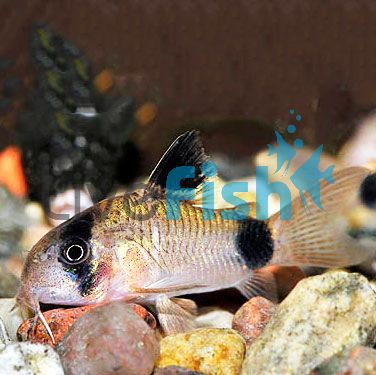Corydoras Panda 2cm
After experiencing the amazing behavior of bronze corydoras, the panda Cories tend to be the first entry into the world of corydoras species. Since these panda corydoras stay fairly small and have this simple but adorable aesthetic it winds over so many aquarists which is why these corydoras are so popular. Their small size of 4 cm and substrate sifting benefits make them a great alternative to the more common corydoras colours along with only having a slightly higher expense.
Panda Corydoras
After experiencing the amazing behavior of bronze corydoras, the panda Cories tend to be the first entry into the world of corydoras species. Since these panda corydoras stay fairly small and have this simple but adorable aesthetic it winds over so many aquarists which is why these corydoras are so popular. Their small size of 4 cm and substrate sifting benefits make them a great alternative to the more common corydoras colours along with only having a slightly higher expense.
The panda corydoras as their name suggests sharing a very close colour resemblance so pandas. They have a white body colour with bands of black going across the eye, dorsal fin, and just before the tail. There is also a unique gold sheen and some metallic spots across the body as well that stand out under the aquarium lights.
Just like any other corydoras species the pandas constantly stir the substrate layer to look for food. This behavior ensures they are keeping the substrate turned over and any debris in the water column, which can then be picked up by the aquarium filter. They are almost exclusively bottom-dwelling fish and are an awesome option to add some life to the bottom of the tank. The panda corydoras is not a shy fish either and is constantly active, making them a great and popular fish for the community and planted aquariums. These fish are also considered to be schooling catfish, in the wild they are often seen in groups of a few hundred however in the home aquarium it is recommended to keep at least 3 or more. An ideal school would be around 6 plus individuals to make them feel comfortable and to add some activity to the tank.
Differentiating males and females are possible where the males are often smaller and narrower than the larger-bodied females. The best method to identify is to get a pack of 4-6 panda corydoras and let a pair naturally form. Females are often triggered to spawn after being fed high-quality food and a slight reduction in the temperature. The wild origin of the panda corydoras is South America.
Tank Recommendations for your Panda Corydoras
As panda Cories reach around 4 cm as adults it is best to keep them in an aquarium with a minimum size of around 40 liters. A larger aquarium will always be better due to their active behavior and it also allows for the space to keep other tank mates.
A sand substrate is best as coarser substrates like gravel often result in corydoras damaging their barbels. The panda cory would look best against a lighter substrate. Though they have a light body colour the black will contrast against a lighter sand colour. They will also love plants in the aquarium and places for cover through the addition of driftwood.
Suitable Tank Buddies
Panda corydoras is an incredibly peaceful fish that can be kept in a massive range of community aquariums. They do not display any aggression even when breeding and make for a perfect addition even with sensitive or shy fish. The only factor which should be considered is that Corydoras are almost exclusively a bottom-dwelling species which means that any super active or large top-dwelling fish may outcompete the corydoras for food.
Usually Compatible
community fish such as rams, tetras, angelfish, discus, rainbow fish, and many more.
Sometimes Compatible
Larger peaceful South American cichlids such as Uaru, Severums, and other fish may outcompete them as they are mostly bottom-dwelling fish.
Rarely Compatible
Large and aggressive species such as the Oscars may prey on the Corydoras. This is especially important as Corydoras have spines on their pectoral fins like many catfish, this can result in both the corydoras and the predator fish’s death.
Feeding your Panda Corydoras
Just like any other corydoras these fish are very easy to feed. They will take a wide range of pellets, flakes, and frozen foods. Like any fish, they should be fed a varied diet with a mix of different foods.
The ideal diet would be a good quality micro slow sinking pellet or crushed flake, supplemented with frozen bloodworms, black worms, or even live foods like baby brine shrimp or micro worms.
| Scientific Name | Corydoras panda |
|---|---|
| Care Level | Easy |
| Common Names | Panda Corydora, Panda Cory, Dwarf Panda Corydoras |
| Diet | Carnivore |
| Fish Family | Callichthyidae |
| Lifespan (years) | 10 |
| Max. Length (cm) | 6 |
| Min. Tank Volume (l) | 60 Liters |
| Origin | South America |
| Reef Safe | Yes |
| Sociability | Peaceful |
| Venomous | No |
| Water Conditions | 24-26° C, pH 6.0-7.0 |




